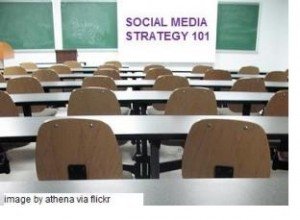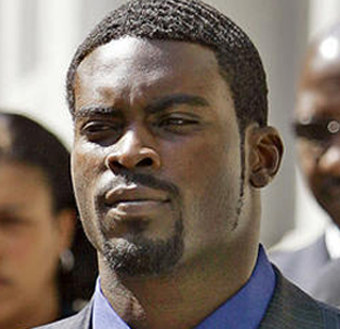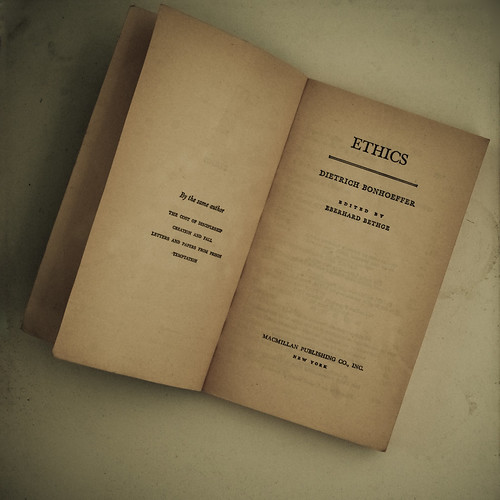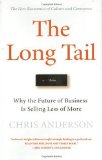Social Marketing Strategy 101: Are you ready?
 Previously, I highlighted how I used social media. After reading recent posts by Dave Fleet and Social Media Explorer regarding the social media marketing ecosystem and measurement respectively, I wanted to expand upon my thoughts about how to take social marketing to the next level.
Previously, I highlighted how I used social media. After reading recent posts by Dave Fleet and Social Media Explorer regarding the social media marketing ecosystem and measurement respectively, I wanted to expand upon my thoughts about how to take social marketing to the next level.
One challenge for many marketers isn’t how to get started, rather it’s how to delegate your time to make the most out of your social marketing. This series of posts will look at putting a social marketing strategy together. And where relevant, I’ll add my thoughts in terms of how PR can leverage this information for their strategies as well.
While many may start strong with social media, these efforts may slowly stop without fully evaluating if you’re ready to embark on a social marketing strategy. Here are six questions to ask yourself before starting:
1. Are your executives supporting you? While social marketing is being adopted by corporations, the question is whether your executives understand the value of social marketing to the business. Since results may not be immediate, you’ll want one executive sponsor who can advocate for the program and highlight the long-term benefits.
2. What are your objectives? The tendency is to start setting up pages and accounts before fully understanding what your objectives are. Take a step back and outline what your goals are before setting up accounts.
3. Where is your audience? Along with your objectives, evaluate where your audience congregates. Jeremiah Owyang of Web Strategist Blog calls this “fish where the fish are.”
4. Do you have something to say? Getting started is easy. Maintaining the momentum is difficult. Do you and your company have something to say, consistently? If not, then maybe starting a blog isn’t the best venue for you but maybe slideshare.net where you can post occasional presentations and white papers.
5. How much time do you have to dedicate to this? According to Exhibitor Media Group, 30% of marketing professionals spend 6+ hours on social marketing a week, with 10% spending 21+ hours. Do you have the time to monitor, create content and track metrics for your programs?
6. Who’s doing the work? Ok, you’ve identified someone who has the time, but who is that person? Social marketing is an extension of your corporate brand. You need to have the right individuals in place to evangelize and steward your brand.
Conclusion
By answering the above six questions, you can develop the right approach that fits your company and time. What other questions should one ask before pursuing a social marketing program?
PR Freelancers versus PR Agencies: Five Points to Consider

Four years ago this month, I left the agency side to move in-house. During this time, I’ve had the opportunity to work with different types of agencies, do an agency search and consider the value of working with a PR freelancer. If you decide to bring in outside PR help, here are five points to consider:
Administration
The general rule of thumb is that 10% of any retainer goes toward administration. On this point, I do favor opting for a PR freelancer over an agency, especially if you have a smaller budget. Working closely with a contractor streamlines the process, focusing more on the tangible PR work versus administrative activities such as detailed weekly reports, activity reports, etc.
More Arms and Legs
Let’s be frank, the idea of bringing in outside PR is to provide more arms and legs to get the work done and deliver results. This will vary on your budget and PR objectives. A PR agency has a slight edge as the agency can grow with your PR needs. A PR contractor will be limited by the number of hours in her work week.
Transparency
Along with administration, another aspect is transparency on what work is being done for your monthly retainer and by whom. Like administration, I believe a PR contractor has the edge over an agency. A contractor’s work is very evident based on the results provided and daily interactions. With a PR agency, it can be difficult to know who is truly pitching your business to the media – the seasoned account manager or the fresh-on-the-job account coordinator. Believe me, when a reporter forwards you an obvious mass pitch sent from the AC, you start wondering about the “transparency” that an agency provides.
International Coverage
Our world is more economically intertwined that it’s ever been. At some point, so will/may your business. Being able to reach global media, understand local customs and cultures, and communicate your messages accurately will be difficult with a PR contractor – no matter how well connected she may be. A PR agency with a global network or branches will provide an advantage for expanding your business and messages globally.
Experience & Strategic Counsel
On this one, I believe an experienced PR contractor and good agency will be on pare with one another. My one beef is the use of “name dropping” as a sign of experience. No – that’s a sign that you are a good networker but not necessarily a good PR person. The things I look for are:
* Chemistry: Does the person/team have a good rapport with you?
* Results to date: What results have they delivered in the past and for what type of client? Getting cover stories for a Fortune 100 does not apply to a start-up company.
* Referrals: Who is willing to vouch for the person? Ask for referrals to support what is being said in the room
* Does the Tail know what the Head’s doing? This one mainly refers to PR agencies. Oftentimes (and this has happened to me), a Director/VP and above will promise something to the client that falls to the team to implement. Or there is too divergent of thinking between the “team” handling the day-to-day and the “executive” counsel that parachutes in.
* Domain Expertise: This is tough one for me. I lean towards selecting someone/agency that really knows PR over domain expertise. Why? If you know how to speak with reporters and position a company, this transcends industries. The one exception that I can consider is if you MUST launch immediately; thereby requiring instant access to the reporters/influencers in your space.
Conclusions
In the end, selecting a PR contractor or agency depends on your objectives, budget constraints, size of company and working style. Pease let me know if there are any other points to consider in the comments.
Tweet this on Twitter
PR Contractor versus PR Agency: 5 Points to Help You Decide by @csalomonlee: http://bit.ly/8GDGSJ #marketing #pr
The Rehabilitation of Michael Vick’s Image
 Every Sunday, my husband and I watch 60 Minutes. While most of the stories are reruns this summer, 60 Minutes aired the first public interview with Michael Vick who recently left prison on dog fighting and cruelty charges. Check out the video and article here. I’m a huge football fan and was surprised that the Philidelphia Eagles took a chance by signing Vick earlier this week.
Every Sunday, my husband and I watch 60 Minutes. While most of the stories are reruns this summer, 60 Minutes aired the first public interview with Michael Vick who recently left prison on dog fighting and cruelty charges. Check out the video and article here. I’m a huge football fan and was surprised that the Philidelphia Eagles took a chance by signing Vick earlier this week.
While watching the interview, I couldn’t stop thinking about the strategy that Vick and his team (lawyers, agency and brand/PR folks) are using to manage and rehabilitate his reputation.
- 60 Minutes Interview: Lends credibility that Vick truly understands the gravity of hissituation and previous decisions and his true intent/desire (?) to redeem himself.
Association with Humane Society: With the Humane Society’s willingness to believe in Vick’s resolve to atone for his mistakes, the hope is that fans will also take that chance on him as well.
Controlled Public Appearances: Since being released, Vick has been very careful about his public image and statements. To my knowledge, he’s been dressed conservatively with a serious demeanor, further emphasizing that he is not the same person he was 2 years ago.
Conclusions
If Vick is truly sincere, I think these efforts will eventually have their desired affect with most out there – let’s be honest, a certain segment of animal lovers will never forgive him for his actions. There will be a healthy level of skeptism that Vick hasn’t changed and is just implementing a very sophisticated PR strategy to make money.
Regardless of which camp you belong in, I do believe that he is executing the right strategy to start down the road to redemption. What do you think?
PRMM Interview: Jason Falls Discusses Social Media and Communications
A couple of weeks ago, I met up with Jason Falls of Doe Anderson and Social Media Explorer. After a beautiful meal at Il Fornaio with Jason and his wife, we sat down for a quick video about social media and communciations strategies. Here is a summaryof this video.
Communications Strategy: Traditional and Social Media
* Communications strategies for traditional PR is typically one that looks at talking points and messages we want to communicate via traditional media
* Traditional media is about one-way communciations with the audience
* With social media, traditional media is no longer part of this as now you’re going direct to the consumer
* No longer is it one-way communications. It’s about how you can create a strategy to communicate these talking points in a conversational way
Different for B2B and B2C?
- Not necessarily as B2B is in between the two extremes of traditional media and social media
- Regardless if this is B2B or B2C, social media requires a conversation
- How can you be nimble in your conversations
Tweet this on Twitter
PRMM Interview with Jason Falls regarding social media and communications strategy by @csalomonlee: http://twurl.nl/a70p7g
PR Ethics – How far would you take it?

Ethics by Josephgilbert.org via Flickr
My husband likes to say that everything we do for public relations is basically bull crap. I always argue with him that public relations fills an important role in how company’s present themselves to the public. It never seems to work because his point is that companies are just lying to consumers and the public to sell more stuff. When he points to how oil, car, pharmaceutical, etc. companies market themselves, it’s sometimes hard to argue. In fact, he’ll even point to an instance when a spokesperson blatantly lied to better position his or her company.
I admit, he does have a point. As public relations professionals, what is our ethical obligation to our clients, and ourselves, if we know that a client is pushing the edge of truth? At what point does “messaging” become “lying”? And do private companies “get away” with more than public ones?
And what if you see a competitor blatantly lying or contradicting previously stated comments, do you have an ethical obligation to point this out to a reporter?
From my perspective, we as an industry have a bad rap for being flacks precisely because there are some PR practitioners out there who are willing to push the edge alongside with their clients. One “small” lie can quickly avalanche into new products and features to stay top of mind with reporters, but do your customers a disservice when those features aren’t “technically” available for weeks or months.
But I also have to remind myself that sometimes the clients insist that we go to market with a message that we know in our bones is inaccurate or obfuscating the truth, then what is our ethical obligation? For me, it comes down to my personal ethics. I think we have an obligation to provide our recommendation and if the “lie” is so egregious, to excuse ourselves from that campaign or account entirely or even resign from the company.
What do you think?
Sometimes "Sorry" Is the Best PR
My apologies – this was a guest post by Alli Gerkman when I was on vacation. I didn’t realize that I had to approve this, so here’s the missing guest post:
So, I’m sitting here in a hotel room in Sacramento, one day into a two-day conference. I’d been thinking about what to write since last week when Cece asked me to guest post, but after the day I’ve had, I’m changing direction. That’s the funny thing about blogging. You never know where it’s going to take you.
I’m in Sacramento because I organize and run legal conferences around the country-about 24 each year. Usually, things go seamlessly (or almost seamlessly-it’s hard to imagine a completely error-free event). Occasionally, things don’t. Today was one of those days.
Each mistake, on its own, is relatively innocuous. The conference room is moved and is difficult to find. But people find it and life goes on.
We notice the printer left a section out of the materials. Okay. We can get Kinkos to deliver the missing section within hours.
But then the computer dies mid-presentation, forcing a speaker to finish without PowerPoint. Now people are starting to think, “What is going on here?”
Indeed.
I take these mistakes pretty seriously. The speakers I line up for my conferences are leaders in their fields and the attendees have given us tuition and entrusted us with two full days of their valuable time, so I don’t like to disappoint.
That said, most mistakes are out of my personal control. I could get bogged down in explaining that: “See, after I do the final edits on the materials, it goes to our printer who prints and ships the book. That missing section was there when I reviewed it, but I don’t have another review between when the finals are printed and when they are shipped to the hotel, so there was nothing I could do other than get Kinkos to print the section and send it over.”
But does anyone want to hear that? Did you even want to read it just now? Does it help address the situation in any way? Probably not. So instead, I say, “I’m sorry.”
And I mean it.
Of course, I can’t stop there. “Sorry” doesn’t mean I’m off the hook-it means I’m working harder than ever to get things back on track. But it’s a start to building a stronger relationship with our speakers and attendees. Believe it or not, some of my best evaluations have come from conferences that couldn’t catch a break. After all, it’s easy to represent your company or your brand when everything is going right, but it’s how you react when things go wrong that can set you apart.
Tomorrow is day two and I think we’re in good shape, but wish me luck.
Revisiting PR Firms and Social Media
The response to my post on which PR firms hasd a social media presence was, well, more than I expected. My post received 66 comments while Jeremiah Owyang’s post had 47 comments. When reviewing the comments, you could see two audiences emerging:
– those who believe that you have to practice what you preach and
– those who believed that corporate presence wasn’t as important as much as the work that was done for clients and the individual participation within those firms
Regardless of which camp you belong to, the discussion resulted in the creationing of a wiki to allow PR firms to proactively update their profiles. To the A few firms that did proactively update their profilesm thank you. To those who haven’t yet, why not?
Overall, here is the breakdown:
– 109 firms are on the list
– 50 firms have blogs
– While 38 firms have corporate Twitter profiles, 5 firms deferred to individuals versus corporate Twitter. In total, 13 firms had individuals participating on Twitter.
– 47 firms had a Facebook presence, while 38 had LinkedIn
– 16 firms have started using Flickr, YouTube and Second Life
So, who else is missing from the list? Go to http://prfirmssocialmedia.pbwiki.com to make the udpates.
About
Favorite Service
Recent Comments
- on Going Virtual Isn’t Necessarily the Answer to Replacing Your Physical Events
- on Going Virtual Isn’t Necessarily the Answer to Replacing Your Physical Events
- on Going Virtual Isn’t Necessarily the Answer to Replacing Your Physical Events
- on Going Virtual Isn’t Necessarily the Answer to Replacing Your Physical Events
- on Going Virtual Isn’t Necessarily the Answer to Replacing Your Physical Events
Ads by Google
Favorite Books
Marketing Blogs
PR Blogs
- KD Paine's Measurement Blog
- Micro Persuasion
Virtual Events & Meetings Blogs
- Cisco Virtual Environments
- It's All Virtual
- The Webinar Blog
- Virtual Edge Institute

 Follow
Follow
 Cece Salomon-Lee is director of product marketing for Lanyon Solutions, Inc. and author of PR Meets Marketing, which explores the intersection of public relations, marketing, and social media.
Cece Salomon-Lee is director of product marketing for Lanyon Solutions, Inc. and author of PR Meets Marketing, which explores the intersection of public relations, marketing, and social media. 


